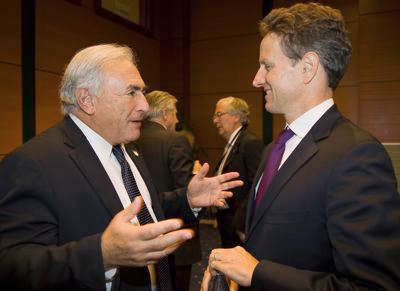|
22 October 2009 from VoltaireNet Website
The G-20, the self-proclaimed global regulation authority, has decided to bolster the capacity of the IMF and the World Bank to siphon the wealth from the South in order to solve the crisis in the North.
In an effort to conceal the ruthlessness of this policy, at their Istanbul meeting the international institutions agreed to give the IMF a new face while leaving intact the voting principles of its General Assembly.
The leaders of the CADTM (Committee for the Abolition of the Third World Debt) denounce this consequential widening of world imbalances.
Dominique Strauss Khan, Managing Director of the International Monetary Fund (IMF), discusses with his main constituent Timothy Geithner, US Secretary of the Treasury (Istanbul, 3 October 2009). The United States alone hold 16% of the voting rights and, together with their principal allies, easily control the institution.
For the second consecutive day, the 10,000 policemen who had been called upon for the occasion used water cannons, tear gas and tanks against demonstrators. The same scenario had been played out at the G20 summit in Pittsburgh, where demonstrations against this G8 substitute were also violently repressed by police forces.
The IMF and the WB held these controversial meetings only days after the G20’s decision to change the voting rights within these two institutions:
The current voting system was challenged both by
countries of the South and by social movements: it relies on the “1 dollar =
one vote” rule, contrary to the UN General Assembly where each country has
only one vote.
The Rwanda group, representing 24 Subsaharan African countries and some 225 million people, holds 1.39 % of the voting rights!
No need to be a keen mathematician to understand that these media-hyped pseudo-reforms will not turn the IMF and the WB into democratic organizations. Can they ever become democratic considering that the present system cannot be changed without the US’s consent?
To make things worse, since 1944, according to a
tacit agreement, the WB’s President has always been a US citizen while the
director of the IMF has always been a European. Such power-sharing combined
with a deeply antidemocratic allocation of voting rights is evidence that
the IMF and the WB are tools in the hands of Western powers in order to
impose self-serving policies upon the rest of the world.
But since the end of 2008, the global crisis has radically changed the situation.
The list of badly hit countries keeps getting longer and the G20 has restored the IMF and the WB as key actors in the global game. Romania yielded to IMF pressure and implemented anti-welfare policies such as a 15% cut in civil servants’ incomes, in order to receive a loan to deal with short-term emergencies. The same has occurred in about fifteen countries since 2008.
The World Bank has benefited from the
environment crisis by setting up several climate investment funds, though it
continues to finance deforestation and mining projects. Over the course of
2008, funds for clean energy were five times lower than those dedicated to
non-renewable energy, the amount of which rose by over 165%. [1]
At the Istanbul summit it was decided to,
It’s easy to guess what the IMF’s recommendations will be...
In June 2009 the IMF commented on policies implemented in the Euro zone:
The WB report “Doing Business 2010” is even more explicit since it warns countries against social protection programs and calls governments that develop them ‘anti-competitive’. [5]
In spite of its repeated failures, the
Washington Consensus, a kind of code for neoliberalism, still is the IMF’s
and the WB’s tall order to countries that ask for their ’help’.
This will happen unless governments decide to suspend payment so as to meet fundamental human needs and to launch a large-scale audit of their debts in order to unconditionally cancel the illegitimate portion of them, which did not benefit the people. An audit of this kind would be a first and crucial challenge to the grizzly policies enforced by the IMF and the WB.
We must now demand that they be replaced by
institutions that truly care for the people’s interests.
References
|

